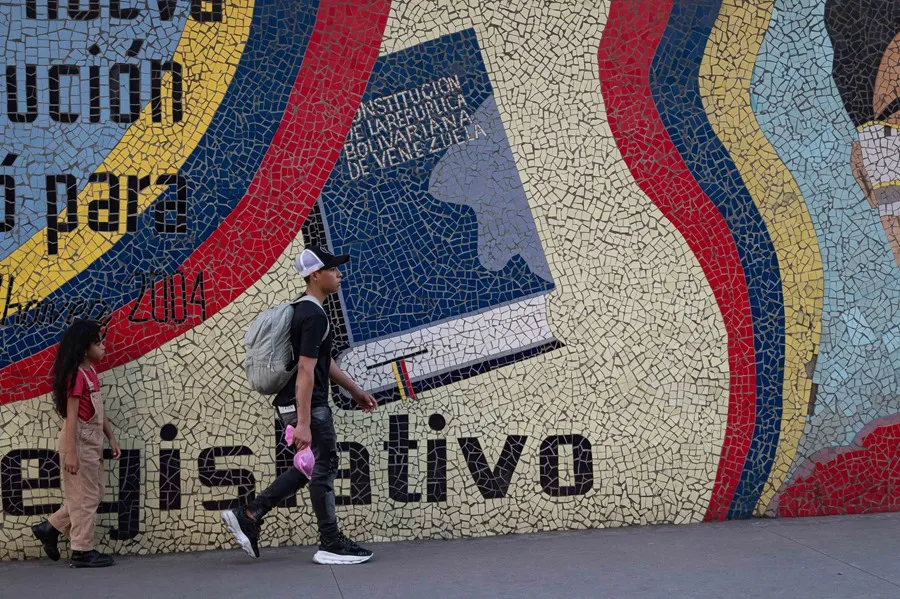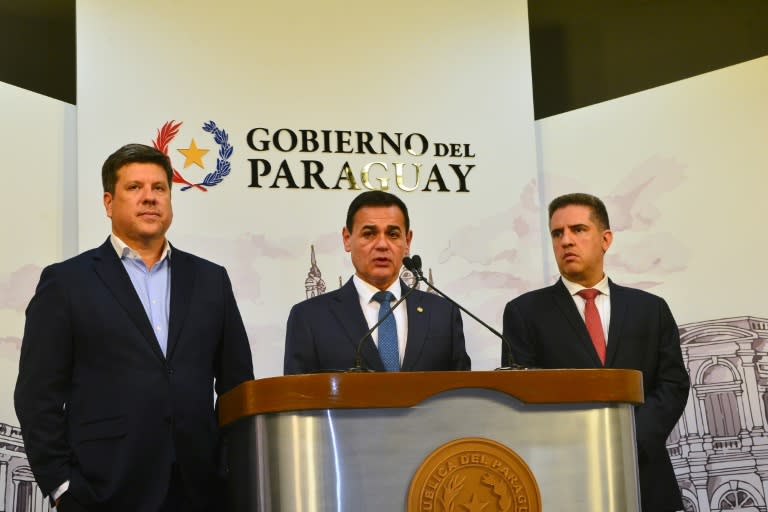International
The Constitution of Venezuela, a quarter of a century later

The Constitution of Venezuela reaches its 25th anniversary this Sunday with a questioned compliance with its precepts and a country far from that described in the Magna Carta – approved in a popular referendum on December 15, 1999 -, of which Chavismo and the opposition mutually accuse each other.
The text, which obtained 71% of the votes in favor – in a day marked by a high abstention and a natural disaster that took the lives of thousands in the north of the country -, was prepared to “establish a democratic, participatory and leading society,” in a “State of justice” that “consolidates the values of freedom” and guarantees human rights.
A quarter of a century later, the refounded ‘Bolivarian Republic’ is experiencing one of its greatest political crises, unleashed after the July presidential elections and marked by protests, police operations, 28 deaths and 2,400 arrests -according to official figures-, complaints of human rights violations, uncertainty, diplomatic conflicts and alleged terrorist and magnicide plans.
Here are some of the most invoked constitutional articles in this context:
Art. 5: The sovereignty resides intransferable in the people.
The candidate of the largest opposition bloc – the Democratic Unitary Platform (PUD) -, Edmundo González Urrutia, cited this article in defense of his claimed victory in the elections, a process tarnished by the coalition’s denunciation of fraud and a broad international questioning of the proclaimed re-election of Nicolás Maduro, who also claims popular sovereignty that – he assures – supported him.
Art. 68: Citizens have the right to demonstrate, peacefully and without weapons.
According to the Social Conflict Observatory (OVCS), there were 5,005 protests between January and November, of which – it indicates – 218 were suppressed. The hottest days were those after the elections, with demonstrations pointed out by the PUD as “spontaneous and legitimate expressions” and by the ruling party as “criminal guarimbas (violent revolts)” and “terrorists.”
Art. 49: Due process shall apply to all judicial and administrative proceedings.
Relatives of those who are considered “political prisoners”, activists and NGOs denounce violation of due process, impossibility of appointing lawyers and accessing files, incommunicado, early convictions, pressures to attribute to themselves facts that – they assure – they “did not commit”, transfers away from their places of residence without prior notice, mistreatment and lack of medical care, allegations that the Government denies and describes as false.
Art. 130: Venezuelans have the duty to honor and defend the homeland.
The Parliament – controlled by Chavismo – insisted this year on legislating against the “traitors to the homeland” based on article 130, and one of its most recent actions was to approve the ‘Organic Law Liberator Simón Bolívar’, which establishes penalties of 25 to 30 years in prison and fines of up to one million euros (1,050,400 dollars) for those who promote or are involved in foreign sanctions, as well as political disqualification of 60 years.
Art. 328: The Armed Forces constitute an essentially professional institution, without political militancy, (…) at the exclusive service of the nation and, in no case, to that of any person or political partiality.
The Bolivarian National Armed Forces (FANB), called “deeply Chavista” by Maduro, ratified its “absolute loyalty and subordination” to the head of state after the validation of its controversial victory by the Supreme Court, controlled by magistrates related to the ruling party, and after the PUD urged the military institution to “respect popular sovereignty.”
Art. 91: Every worker has the right to a sufficient salary that allows him to live with dignity and cover the basic needs for himself and his family.
The minimum wage – a reference for the rest of the remuneration in the public sector – has remained, since March 2022, at 130 bolivars, today about 2.5 dollars, when the basic food basket for a representative family of five people reached 539.79 dollars in October, according to independent estimates, an amount unattainable even with the additional bonuses of 130 dollars.
International
Paraguay summons Brazilian ambassador over Itaipú espionage scandal

Paraguay summoned the Brazilian ambassador in Asunción on Tuesday to demand “explanations” and called its own representative in Brasília for consultations following Brazil’s acknowledgment of an espionage operation. The Brazilian government, led by President Luiz Inácio Lula da Silva, attributed the operation to the previous administration.
The surveillance effort aimed to uncover Paraguay’s position in now-suspended negotiations with Brazil regarding the pricing of electricity from the binational Itaipú hydroelectric plant, according to reports in the Brazilian press.
The Brazilian government “categorically denied any involvement in the intelligence operation,” stating in a Foreign Ministry communiqué on Monday that the espionage was carried out under former President Jair Bolsonaro’s administration (2019-2023).
“The operation was authorized by the previous government in June 2022 and was annulled by the interim director of the (state intelligence agency) ABIN on March 27, 2023, as soon as the current administration became aware of it,” Brazil’s government asserted.
Paraguay’s Foreign Minister Rubén Ramírez announced that Brazilian Ambassador José Antonio Marcondes de Carvalho was summoned “to provide detailed explanations” regarding the operation. Additionally, Paraguay recalled its diplomatic representative in Brasília “to report on aspects related to the intelligence activity conducted by Brazil regarding Paraguay’s government affairs.”
International
Elon Musk to step down as government advisor, per Trump insiders

President Donald Trump has informed his inner circle that Elon Musk will be stepping down from his role as a government advisor, according to a report by Politico today.
Citing three individuals close to Trump, Politico states that the president is pleased with Musk’s leadership at the Department of Government Efficiency (DOGE), where he has implemented significant budget cuts. However, both have agreed that it is time for Musk to return to his businesses and support Trump from a different position outside the government.
A senior administration official told Politico that Musk will likely maintain an informal advisory role and continue to be an occasional visitor to the White House. Another source warned that anyone thinking Musk will completely disappear from Trump’s circle is “deluding themselves.”
According to the sources, this transition is expected to coincide with the end of Musk’s tenure as a “special government employee,” a temporary status that exempts him from certain ethics and conflict-of-interest regulations. This 130-day period is set to expire in late May or early June.
International
Milei vows to make Argentina so strong that Falkland Islanders “choose” to join

Argentine President Javier Milei reaffirmed his country’s claim over the Falkland Islands (known as the Islas Malvinas in Argentina) and praised the role of the nation’s armed forces during a ceremony marking the “Veterans and Fallen Soldiers of the Malvinas War Day,” commemorating 43 years since the 1982 conflict with the United Kingdom.
Argentina continues to assert sovereignty over the islands, arguing that Britain unlawfully seized them in 1833.
“If sovereignty over the Malvinas is the issue, we have always made it clear that the most important vote is the one cast with one’s feet. We hope that one day, the Malvinas residents will choose to vote with their feet and join us,” Milei stated.
“That is why we aim to become a global power—so much so that they would prefer to be Argentine, making deterrence or persuasion unnecessary. This is why we have embarked on a path of liberation, working to make Argentina the freest country in the world and once again the nation with the highest GDP per capita on the planet,” he added.
-

 Central America3 days ago
Central America3 days agoU.S. Homeland Security Secretary urges Mexico to strengthen Guatemala border
-

 Central America3 days ago
Central America3 days agoPanama grants Martinelli 72-hour extension to travel to Nicaragua
-

 International1 day ago
International1 day agoParaguay summons Brazilian ambassador over Itaipú espionage scandal
-

 Central America4 days ago
Central America4 days agoPanama police clarifies that Interpol alert for Martinelli is still pending
-

 International3 days ago
International3 days agoTrump urges Putin to reach peace deal
-

 International4 days ago
International4 days agoDeportation flight lands in Venezuela; government denies criminal gang links
-

 Sports1 day ago
Sports1 day agoFilipe Luis debuts as coach in Copa Libertadores with Flamengo
-

 Central America1 day ago
Central America1 day agoGuatemalan police officer killed in mob riots over baby kidnapping
-

 International1 day ago
International1 day agoElon Musk to step down as government advisor, per Trump insiders
-

 Sports1 day ago
Sports1 day agoVenezuela investigates 18 baseball players seeking asylum in Spain
-

 International1 day ago
International1 day agoMilei vows to make Argentina so strong that Falkland Islanders “choose” to join
-

 International1 day ago
International1 day agoICE agent’s arrest of suspect sparks controversy in Boston
-

 International1 day ago
International1 day agoÓscar Arias: Trump’s trade policies are a step backward















